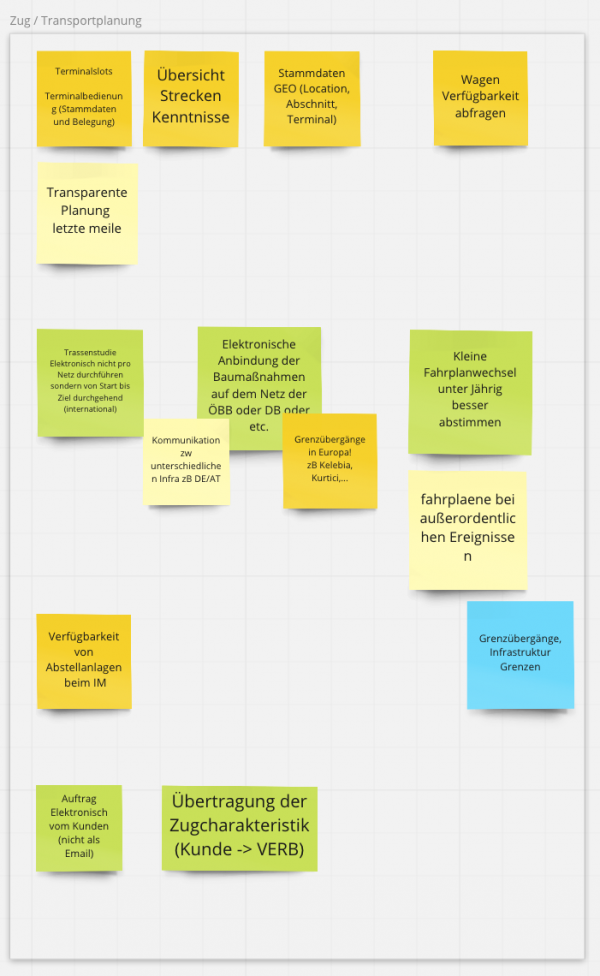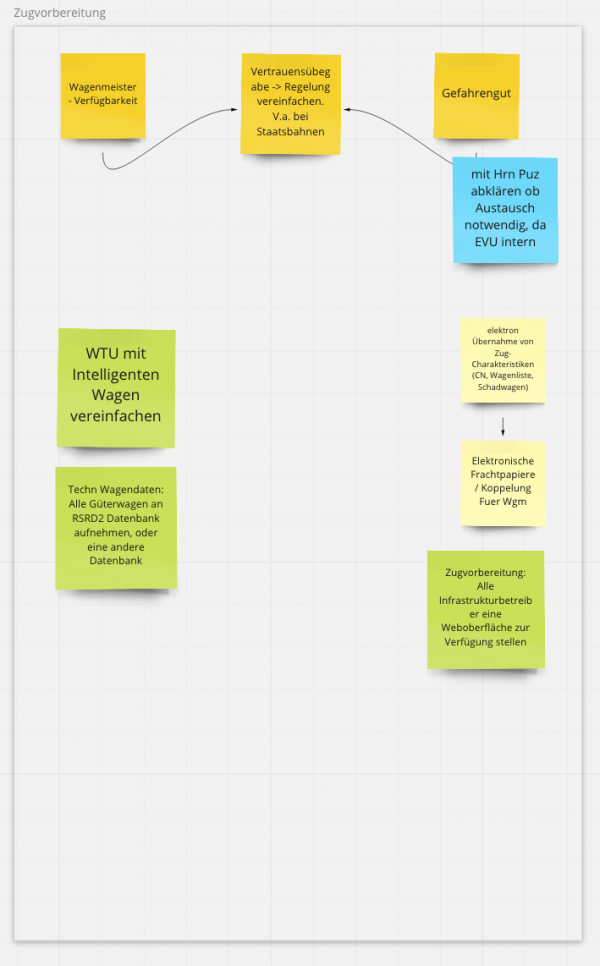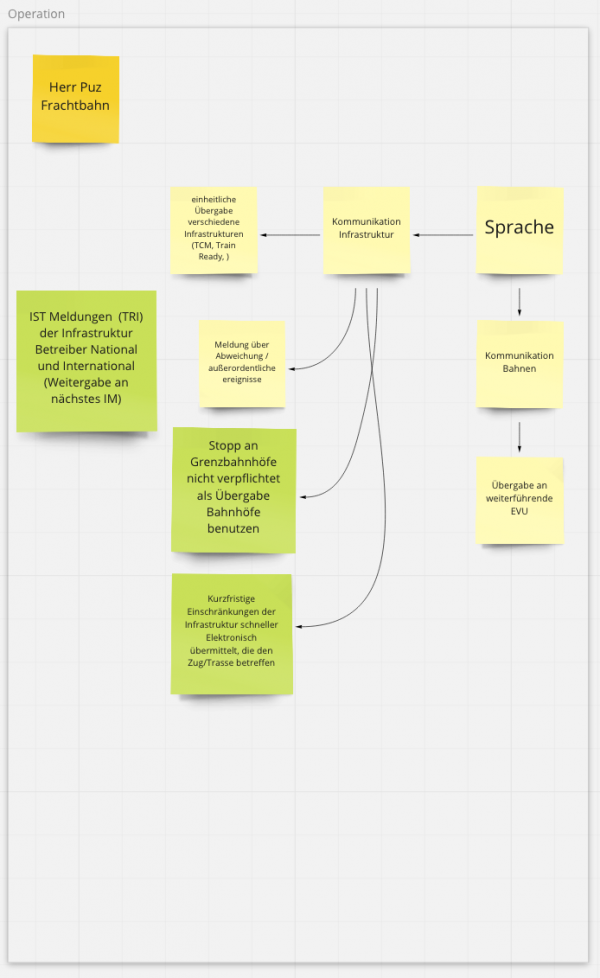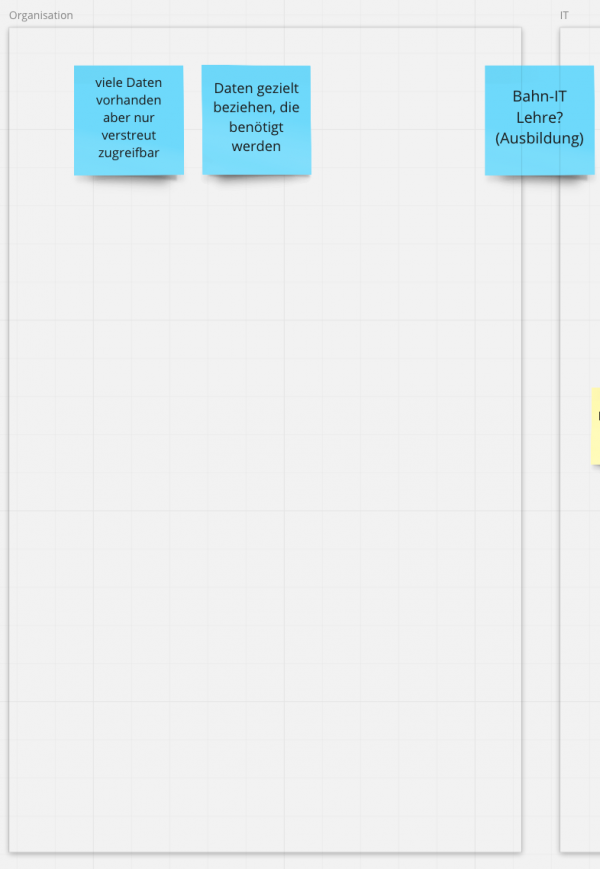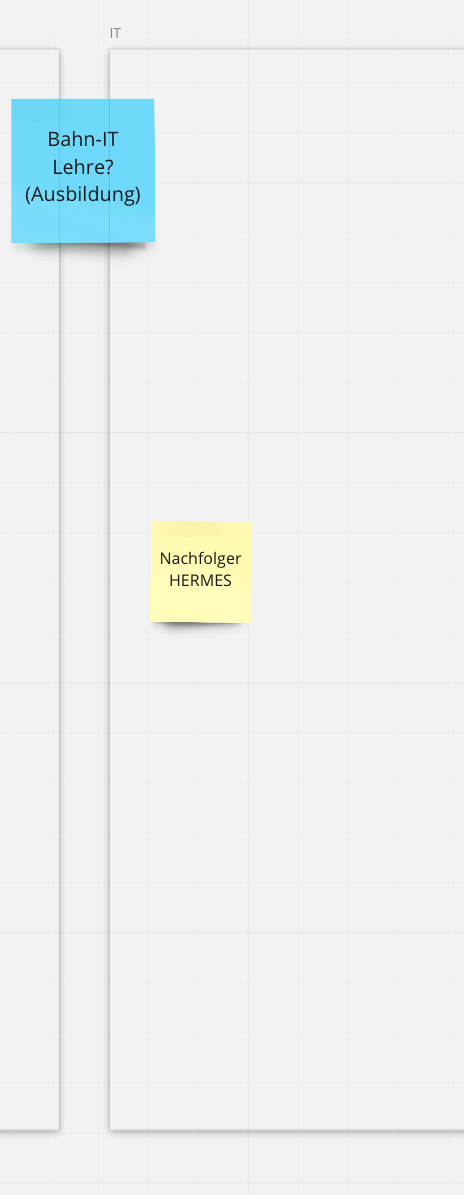DS DE2 GAP
Organisation
The GAP Session was held on 7.September 15:00 to 17:00 with three participants
- Bernd Müller Wiener Lokalbahn Cargo AG
- Michael Thaller Wiener Lokalbahn Cargo AG
- Ulrich Puz Frachtbahn AG
The SOLution Session is planned for end of October
GAP
Train Planning phase
The raised topics can be grouped into the RFF services:
- Train Service Harmonization
- Terminalslots, Terminalbedienung (Stammdaten und Belegung)
- Transparente Planung letzte meile
- Elektronische Anbindung der Baumaßnahmen auf dem Netz der ÖBB oder DB oder etc.
- Kleine Fahrplanwechsel unter Jährig besser abstimmen
- Trassenstudie Elektronisch nicht pro Netz durchführen sondern von Start bis Ziel durchgehend (international)
- Grenzübergänge in Europa! zB Kelebia, Kurtici,...
- Kommunikation zw unterschiedlichen Infra zB DE/AT
- fahrplaene bei außerordentlichen Ereignisse n
- Grenzübergänge, Infrastruktur Grenzen
- Verfügbarkeit von Abstellanlagen beim IM
- Facilities on Location
- Übersicht Strecken Kenntnisse
- Stammdaten GEO (Location, Abschnitt, Terminal)
- Empty Wagon Broker
- Wagen Verfügbarkeit abfragen
- Digital Consignment Note
- Auftrag Elektronisch vom Kunden (nicht als Email)
- Übertragung der Zugcharakteristik (Kunde -> VERB)
Train Preparation phase
In the Preparation phase the raised topics are grouped to:
- Digital Train Handover
- Vertrauensübegabe -> Regelung vereinfachen. V.a. bei Staatsbahnen
- elektron Übernahme von Zug-Charakteristiken (CN, Wagenliste, Schadwagen)
- Wagenmeister - Verfügbarkeit -> mit Hrn Puz abklären ob Austausch notwendig, da EVU intern
- Gefahrengut -> mit Hrn Puz abklären ob Austausch notwendig, da EVU intern
- WTU mit Intelligenten Wagen vereinfachen
- Digital Consignment Note
- Elektronische Frachtpapiere / Koppelung Fuer Wgm
- Technical Wagon Data
- Techn Wagendaten: Alle Güterwagen an RSRD2 Datenbank aufnehmen, oder eine andere Datenbank
- Digital Train Composition
- Zugvorbereitung: Alle Infrastrukturbetreiber eine Weboberfläche zur Verfügung stellen
Train Operation phase
The operational topics relate to the RFF services:
- Digital Train Composition
- Sprache
- Kommunikation Infrastruktur
- einheitliche Übergabe verschiedene Infrastrukturen (TCM, Train Ready, )
- Digital Train Operations
- Meldung über Abweichung / außerordentliche ereignisse
- Stopp an Grenzbahnhöfe nicht verpflichtet als Übergabe Bahnhöfe benutzen
- Digital Train Handover
- Kommunikation Bahnen
- Übergabe an weiterführende EVU
- Information exchange with IM
- Kurzfristige Einschränkungen der Infrastruktur schneller Elektronisch übermittelt, die den Zug/Trasse betreffen
- IST Meldungen (TRI) der Infrastruktur Betreiber National und International (Weitergabe an nächstes IM)
Organisational Issues
In the round the need for
- viele Daten vorhanden aber nur verstreut zugreifbar
- Daten gezielt beziehen, die benötigt werden
- Bahn-IT Lehre? (Ausbildung)
are prerequisites to participate in the digital data exchange.
IT Issues
In the round the need for
- Nachfolger HERMES
are prerequisites to participate in the digital data exchange.
English Summary
In the second German speaking GAP Discovers session the three participants raised the above noted issues. To summerize those topics they can be grouped under the following services. The following up SOLution Discovery Session to discusss in plenum possible solutions will be held at the end of October.
Infrastructure masterdata
- Reliable and uptodate information about nodes and segments (CAP01 GEO)
- Infrastructure restrictions: Network segment and node restrictions caused by planned/unplanned maintenance works and incidents.
- Local information about nodes capacities and facilities e.g. required for loco driver knowledge
IM data exchange
- Network border crossings are a major hurdle for planning international train services. Among others this is due to language restrictions, network rules and behaviour.
- specific information - uptodate and accurate - is needed related to the path.
- planning (timetable, characteristics) and operational (delays) train information should be passed between IMs directly.
Wagon masterdata
- GCU messages concerning WagonDamage and WagonRepairHistory (RailWatch)
- Complete and uptodate technical wagon masterdata
- Access to sensor information on the wagon
Train Service planning
- Common train service planning (technical characteristics and timetable)
- Open information about train service plannning status
- Planned terminal slot
- Aligned path request with RU partners across Infrstructure network borders (BE-NL-DE-CH-IT) depending on the role (contract holder, carrier)
- International and national Path request
- Accurate operational train information
Train Service HandOver
- Goods information including status (Combined Traffic)
- Complete, ontime train preadvice messages
- digital, standard format,
- throughgoing from customer and RU partner,
- dangerous goods
- Provisionig of complete wagonlist
- digital
- Provisioning of parked units, wagons
- planned
- operational (real location)
- Complete informationset for loco driver
- Handover information
- Digital exchange of train accompaning documentents incl ADR/GGVE
- rules for train running "in confidence" should be streamlined to enable smaller player to participate
Train Service Monitoring
Train Running Information
- Detailed delay information from IM and RU partner
- Throughgoing train running information (from slot to slot)
- Centralized portal for interested parties to monitor the transport along the whole route from HLR to MAD (with specific perspectives)
Technical and organisational issues
In the round the need for
- an easy technical access and
- think about a successor of HERMES protocol
- a suitable (light) user model
- an education on the level of an apprenticeship for railway IT specialists
are necessary to advance the digital data exchange.
